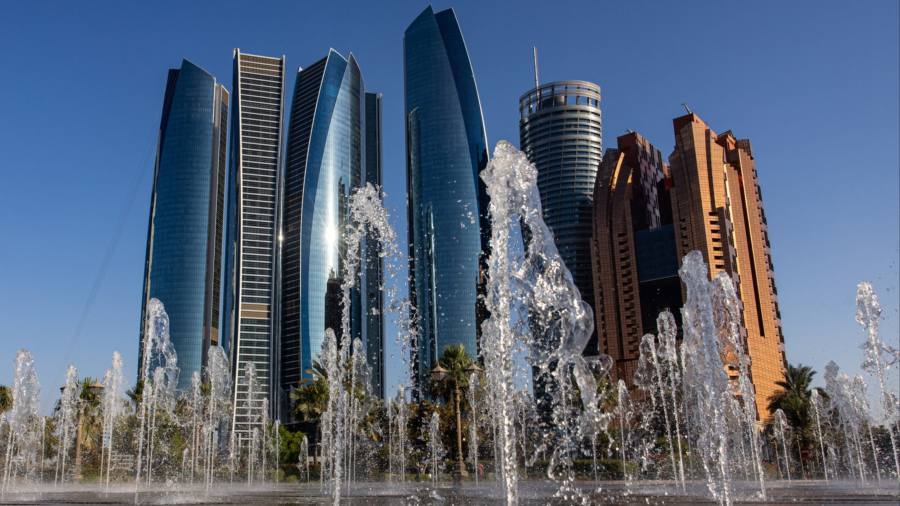
Speakers at a climate and health conference in the United Arab Emirates were told not to protest or “criticise corporations” in a warning that cited the Gulf state’s laws, alarming campaigners ahead of the country hosting the UN’s COP28 climate summit this year.
Organisers advised panellists at last month’s Forecasting Healthy Futures event in Abu Dhabi, the UAE capital and its richest emirate, to “be aware and respectful of UAE laws”, and warned: “Do not criticise Islam, UAE government, corporations or individuals”, and “do not protest”.
The written guidance, seen by the Financial Times, added: “We understand that climate change can be a controversial subject and we welcome all perspectives and opinions in civil discourse throughout the programme agenda. Protesting is illegal in the United Arab Emirates and any instances of disruptive protesting will be handled by the local authorities.”
Climate activists said the restrictions on free speech raised more questions about the suitability of the oil-rich UAE to host the annual UN climate summit, which will take place in November and December. Top scientists have warned of a “rapidly closing window” to limit global warming to 1.5C above pre-industrial levels.
“This is deeply concerning,” said Collin Rees, of Oil Change International, a US climate group. “The language circulated here cannot be acceptable at the climate talks. There should be strong pushback on this and the UN should provide as strong a place as possible for the upcoming COP.”
Large protests are often organised to coincide with the annual climate event, with about 100,000 people taking to the streets of Glasgow on a single day when the UK hosted COP26. Civil society groups critical of fossil fuel companies attend the summit in large numbers.
The conference on health in the context of climate change was organised by Forecasting Healthy Futures, a group of health and technology organisations convened by Malaria No More.
According to the event’s website, seed funding to FHF was provided by Reaching the Last Mile, a public health and development group with ties to UAE president Sheikh Mohammed bin Zayed al-Nahyan.
Forecasting Healthy Futures said the group did not receive “guidance” from Reaching the Last Mile “or any other UAE individual or institution”.
It added: “In the interest of protecting summit speakers and panellists from any actual or perceived violation of UAE law, and given the expected online coverage of the event, with the potential for misquoting or mischaracterisation, we erred on the side of caution by independently issuing guidance covering the most broad interpretation of UAE’s penal code governing defamation.”
Majid al-Suwaidi, director-general of COP28, gave a keynote speech at the FHF conference, touting the upcoming summit as one that would take an “inclusive” approach to tackling climate change.
Lise Masson, climate justice and energy advocacy officer at Friends of the Earth International, said the COP conferences had long suffered from “corporate capture”. “We’re preparing for this COP to be an extreme and intense iteration of something that isn’t new,” she said.
Cherelle Blazer, senior director at Sierra Club, a US climate group, said it was “vitally important” that members of civil society groups attended the COP, despite it being held in “a place hostile to protesting”.
The host nation has already come under scrutiny over its appointment of Sultan al-Jaber, head of Abu Dhabi’s state-owned oil company Adnoc, to the presidency of COP28.
Last year’s COP summit in Egypt ended in disappointment for many, as fossil fuel producing nations including Saudi Arabia blocked a push by others to include in the final deal a promise to phase down all fossil fuels.
A COP28 UAE spokesperson said the conference would “take an inclusive approach that engages all stakeholders from the public and private sectors, civil society, scientific community, women and youth” and “welcome inclusive, constructive dialogues that facilitate consensus-building to drive ambitious climate outcomes”.
They said organisers would ensure “there are safe spaces where all voices may be heard”.
The UN Framework Convention on Climate Change, which oversees the summit, said the COP venue would be an “extraterritorial space” managed by the UN.
“The meaningful participation of all actors from society in the UNFCCC process and the annual Conference of the Parties (COP) is an indispensable ingredient for the success of these events,” it said.
Additional reporting by Camilla Hodgson in London